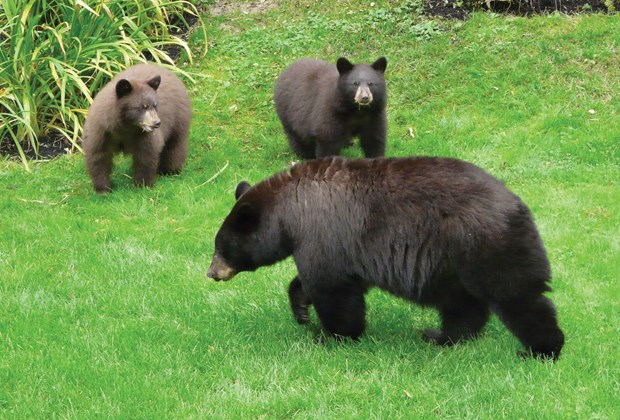West Vancouver just isn’t the place for a single mom trying to raise two young kids.
That apparently applies to bears too.
Conservation officers captured and relocated a mother bear and her two cubs recently after they were turning up to forage for fruit, birdseed and garbage in West Vancouver backyards a little too often.
The sow and cubs had been spotted numerous times in the Sentinel Hill area, the Highway 1 corridor, and Ambleside in recent weeks before finally being tranquilized by conservation officers on 20th Street near West Vancouver secondary.
Bears are currently spending about 20 hours per day fattening up for winter, but the relative ease of finding “people food” may not have been the mother’s only reason to bring the cubs into town. Dominant males in the wilderness may seek to kill the cubs in order to mate with the mother.
“People are surprised she would choose to come to a place that has dogs, and people and traffic. But for her, in some cases, it seems to be the safer option,” said Christine Miller, education co-ordinator for the North Shore Black Bear Society.
Captured bears are typically kept in a cage long enough for the tranquilizer to wear off before being dumped in a remote area of the North Shore backcountry.
Bears’ instinct is to come back to their “home” territory so if they are transported too far, they often die trying, Miller said. One bear picked up in her North Shore yard was dumped in the Interior, only to come back the next year.
“It was moved up the Coquihalla, released way up in the mountains up a forest road and the next spring, it actually returned to the same street,” Miller said. “They know where home is and moving them far away puts them at risk.”
No word on whether this family unit has returned to the lower slopes of West Vancouver, but Miller hopes the mother will get an early start on a winter den or the nasty experience will make her think twice about coming close to humans again.
“They have this theory that it might make them more wary of people. The whole experience is really negative. They’re tranquilized and dropped out of a tree and taken in a trap,” she said.
In the meantime, residents in bear-prone areas need to stop tempting bruins to come into their yards by keeping them free of all attractants, Miller said. If bears find a steady food supply, they will skip hibernation entirely.



